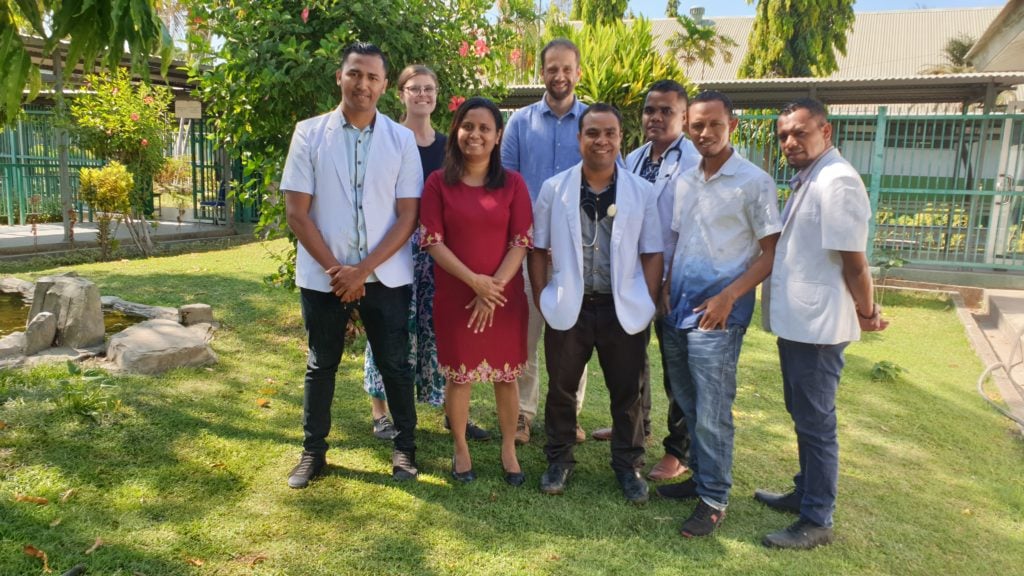This article was written for International Volunteers Day 2019, published December 2019. The placement described in this article ended in early 2020.
Dr Kate Needham remembers her father’s stories from the Australian-led UN Peacekeeping Force INTERFET (International Force East Timor) all too vividly, so when her colleagues in Darwin told her about a volunteer placement as an O&G Senior Registrar at the Guido Valadares National Hospital in Dili, she didn’t hesitate to take it.
“Timor-Leste is our nearest neighbour and the poorest country in South-East Asia, so from a public health point of view it seemed to make sense to come and try and help out in any way possible.”

Kate Needham, Ondrej Simetka and Timorese O&G trainees
However, upon arrival, Kate realised Timor-Leste presented very different challenges to what she was used to.
“Working in a low-resource setting forces you to think outside of the box. You have to manage conditions without many resources. In addition, numerous languages are spoken in the hospital: Tetum, English, Indonesian, Spanish – the notes are in a variety of languages so handover and reading notes can be challenging. Many patients also speak a dialect.”
Perhaps the biggest challenge that Timor-Leste faces is the tyranny of distance. Maternal mortality is high. In fact, the current rate is believed to be higher than the WHO rate, which sits at 215 deaths per every 100,000 live births. Unreported births in rural and remote areas are accountable for this. Given that Timor-Leste’s terrain is quite mountainous, women experiencing complications during pregnancy and childbirth take a lot of time to get to a hospital, which means they are more likely to die in transit.
Kate is volunteering through the Australian Volunteers Program, an Australian Government initiative delivered by AVI. Her assignment is in collaboration with the RACS Program ATLAS 2; a program that has operated for 19 years in Timor-Leste to provide postgraduate training to Timorese medical graduates. The 18-month postgraduate qualification in O&G is the only available postgraduate qualification in the area. Without it, Timorese doctors who wish to complete postgraduate training in O&G would need to travel to PNG, Fiji, Singapore, Indonesia or elsewhere.
The Postgraduate Diploma in O&G aims to train doctors who will be in rural and remote areas to provide O&G care to women and hopefully reduce maternal mortality rates. In her day to day, Kate supports six postgraduate O&G trainees. Her role includes handover, ward rounds, working in wards (antenatal, gynaecology, maternity or postnatal), assisting with exams, and quality improvement consulting in the O&G department. In addition, Kate identifies patients who need family planning and collaborates with them and the local Marie Stopes team to provide counselling on the most appropriate family planning methods for them. In this regard, Kate has been surprised and touched by the generosity of people and the strong sense of community in the hospital, but she has also learnt patience in her role.
“You can’t expect to go in with all guns blazing and try and change everything really quickly. It takes a lot of time to build relationships and gain the trust of the people you are working with. Only then can you slowly try and make changes. I learnt to be patient with myself and my colleagues, to become adaptable and flexible in challenging scenarios and to improve my teaching skills in a different cultural setting.”
5 December marks International Volunteer Day. This year’s theme, “Volunteer for an Inclusive Future”, calls on all of us to pursue equality through our individual skill-sets and capacities. Kate is no stranger to this goal.
“I hope that empowering Timorese doctors with knowledge and training ensures that women living in rural and remote areas get access to adequate healthcare and safe delivery.”
Kate is passionate about reducing maternal mortality rates and about improving gender equity in Timor-Leste, a Catholic and male-dominated country where family planning is often decided by men. Through her work, Kate is trying to promote choice for women and to create an inclusive workplace for female medical trainees, who are slowly becoming more prevalent.
Through volunteerism, communities around the world often experience strengthened solidarity and inclusion. Kate advises O&G trainees wishing to undertake training in low to middle-income countries like Timor-Leste to “just say yes”.
“Give it a go. The experience sets you apart and makes you a more developed clinician, professionally and personally.”
If you’re interested in pursuing global health opportunities, visit RANZCOG’s Global Health webpage.



